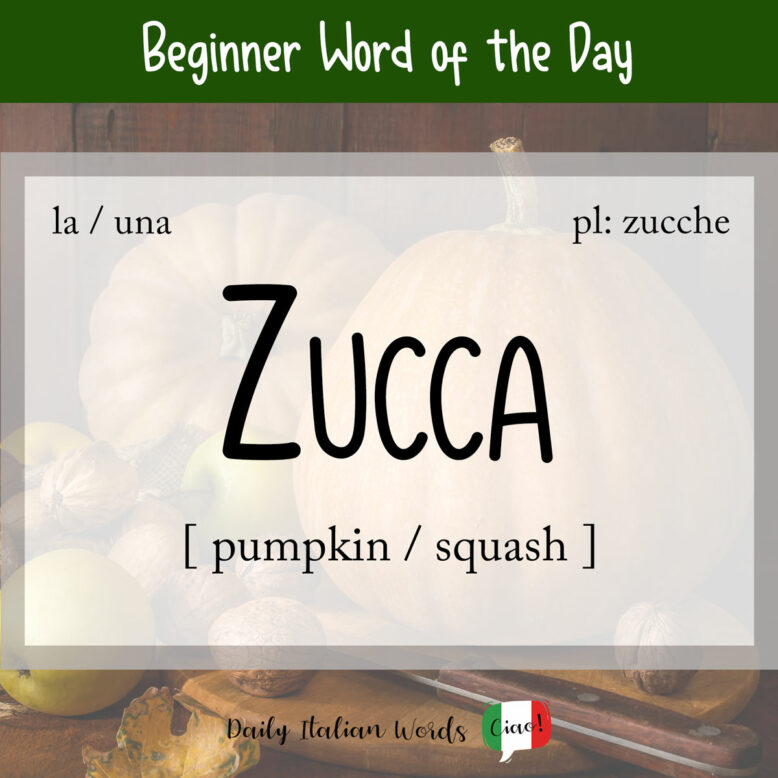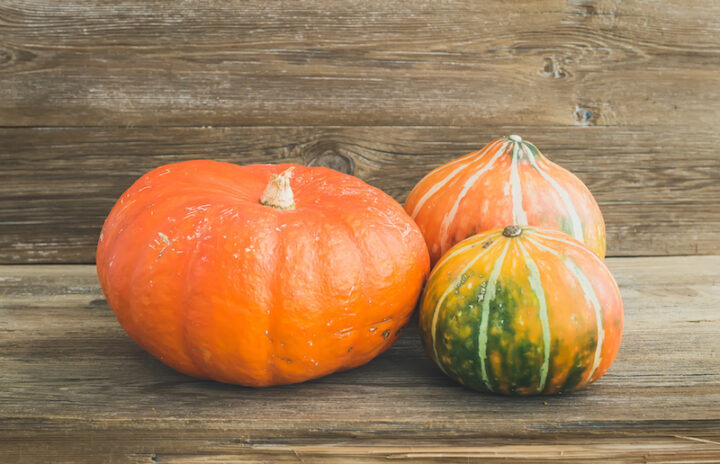Today’s ‘word of the day’ is part of our Italian Halloween Word series. On the days leading up to Halloween, we’ll post a word that is related to this spooky time of year. Enjoy! 🦇
The Italian language has a single term for pumpkin, squash and gourd and that is zucca (feminine, plural: zucche). It derives from the Latin word cucutia.

Here are the definite and indefinite articles that this feminine noun takes:
- la zucca = the pumpkin
- le zucche = the pumpkins
- una zucca = a pumpkin
- delle zucche = some pumpkins
In addition to the fruit, zucca may also refer to the pumpkin plant itself.
Normalmente le zucche si raccolgono in autunno.
Pumpkins are normally harvested in the autumn.

When I was little, my family would often take a trip to the local pumpkin patch (campi di zucche) to hand-pick the pumpkin that would become our jack-o’-lantern (zucca di Halloween). After we had scooped out the insides, we would roast the pumpkin seeds (semi di zucca) and use the guts to make pumpkin pie (torta di zucca), pumpkin soup (minestra di zucca) and pumpkin fritters (frittelle di zucca).
Did you know that…?
Zucchina (the Italian word for zucchini) is actually the diminutive form of zucca. It literally means ‘little squash’ or ‘little pumpkin’. Zucchini, pumpkins and certain kinds of winter and summer squash all belong to the genus Cucurbita.
The practice of carving out pumpkins (intagliare le zucche) at Halloween can be attributed to an Irish myth about Stingy Jack, a man who was barred entrance to both Heaven and Hell after tricking the Devil for his own monetary gain. His punishment was to roam the earth for eternity. To keep Jack’s wandering soul at bay, people began carving demonic faces out of turnips (rape). But when Irish immigrants moved to the United States, they began using pumpkins instead of turnips because they were more plentiful.

Figuratively speaking, zucca is also a humorous way to refer to the human head (testa) in Italian. Below are a few ways in which you might see it used:
- avere / essere una zucca vuota (lit: to have / to be a empty pumpkin) = to be a foolish person
- essere vuoto come una zucca (lit: to be empty like a pumpkin) = to not have brains
- zucca pelata (lit: bald pumpkin) = bald head
- avere sale in zucca (lit: to have salt in the pumpkin) = to be smart, wise
- avere poco sale in zucca (lit: to have little salt in the pumpkin) = to be stupid
Ma che cos’hai in quella zucca?
What’s going on in that head of yours?
A synonym for zucca that is used primarily in the south of Italy is cocuzza. It too can mean head in a figurative sense.
Heather Broster is a graduate with honours in linguistics from the University of Western Ontario. She is an aspiring polyglot, proficient in English and Italian, as well as Japanese, Welsh, and French to varying degrees of fluency. Originally from Toronto, Heather has resided in various countries, notably Italy for a period of six years. Her primary focus lies in the fields of language acquisition, education, and bilingual instruction.


